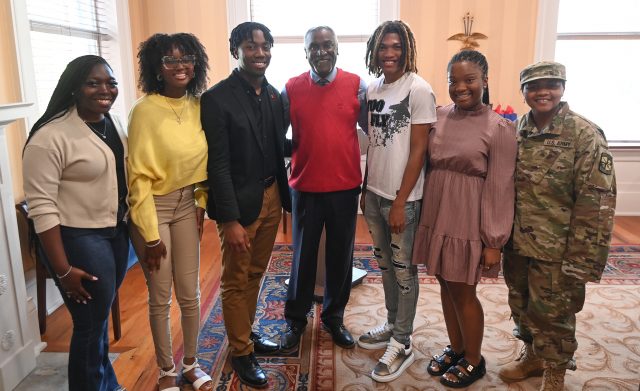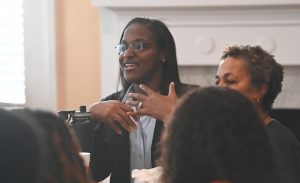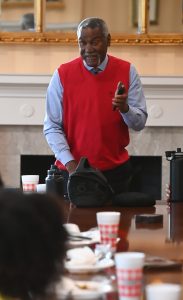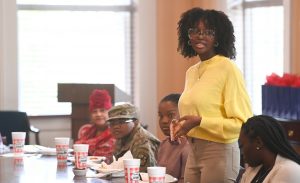
Donald Cole (center), retired UM assistant provost, congratulates inaugural Ole Miss 8 scholarship recipients (from left) Deja Johnson, Fatimah Wansley, Jhalen Wells, Marcus Ball, Jae Darra Betts and Ebonee Williams at a luncheon. The university’s new scholarship was developed to help Mississippi students earn their education. Photo by Kevin Bain/Ole Miss Digital Imaging Services
OXFORD, Miss. – Eight Mississippi residents are the inaugural recipients of the University of Mississippi’s Ole Miss 8 Scholarship, an award commemorating the eight students expelled from campus after a peaceful protest in 1970.
University police arrested 89 students in front of Fulton Chapel during a protest on the evening of Feb. 25, 1970. The students were calling on the university to hire more Black faculty, form an African American studies program, ban the use of Confederate imagery from official university gatherings and establish more scholarships for Black students.
Eight of those students – Donald Ray Cole, John Donald, Theron Evans Jr., Paul D. Jackson, Linnie Liggins, Kenneth Mayfield, Alva Ruth Peyton and Henrieese Roberts – were expelled.

Shawnboda Mead, vice chancellor for diversity and community engagement, speaks with students and community members at a luncheon for recipients of the university’s new Ole Miss 8 scholarship. Photo by Kevin Bain/Ole Miss Digital Imaging Services
The Ole Miss 8 Scholarship will cover tuition, a meal plan and housing for up to four years of undergraduate education. The inaugural class of recipients includes two freshmen, two sophomores, two juniors and two seniors. The university will select two incoming freshmen each year for the award.
“All of us take for granted the sacrifices that had to be made and all the alumni who endured so that we could be here today,” said Shawnboda Mead, vice chancellor for diversity and community engagement. “That process has been collaborative, but acknowledgement of the part of the Ole Miss 8 is critical to understanding our history and where we’re going.”
The inaugural recipients of the scholarships are:
- Marcus Devon Ball, a freshman general business major from Sallis
- Jae Darra Marie Betts, a freshman biological science major from Flowood
- Ebonee Williams, a sophomore allied health studies from Jackson
- Fatimah Wansley, a sophomore international studies major from Jackson
- Frederick Williams, a junior African American studies major from Greenville
- Madison Page, a junior electrical engineering major from Tupelo
- Deja Alise Johnson, a senior criminal justice major from Aberdeen
- Jhalen Wells, a senior integrated marketing communications major from Clarksdale.
In 2020, the university invited back members of the Ole Miss 8 to revisit the site of their arrest and receive their diplomas.
“When I stepped foot on that campus in 2020, that was the first time I had been on that campus since May of 1970,” said Linnie Liggins Willis, who grew up in Oxford.
She had returned to the city many times to visit family after her expulsion, but she never visited nor spoke of what happened. Not even her children knew the full story of the arrest and expulsion until the reunion in 2020, she said.

Donald Cole, retired UM assistant provost, speaks with the inaugural recipients of the university’s new Ole Miss 8 scholarship at a luncheon. Cole was among the original Ole Miss 8 – a group of eight students who were expelled after a protest in 1970. Photo by Kevin Bain/Ole Miss Digital Imaging Services
“One of the things that really struck me was when I was there – as we were – at Fulton Chapel,” Willis said. “It was the last day of the gathering there and a young man came over to me and said that he wanted to meet me personally. He said he had no idea of this history. He said, ‘I had no idea you made that sacrifice for me.’
“When that young man said that to me, I felt that – as much as I thought I wouldn’t want to come back – it was all worthwhile.”
Each of the five members of the Ole Miss 8 who returned in 2020 agreed that one of the best ways to commemorate their experience would be to give students a chance to earn their education, Mead said.
“We didn’t have a chance to realize our dream back then, but young people coming after us can,” Willis said. “It’s important that they know and there are people there who will work with them and who will do everything they possibly can to make sure they succeed. I just want them to succeed.”
Alongside alleviating the financial burden of an education, the scholarship program will help build connections and mentorships for selected students. The students are paired with members of the university community, offering engagement opportunities and encouraging their participation in campus organizations.
The students also can interact directly with members of the Ole Miss 8 to learn about the history of the scholarship, said Roger Davis, inclusive excellence and engagement director in the Division of Diversity and Community Engagement.
“We’re hoping to get these students involved on campus and get them connected to different academic departments and help them reach their career goals,” Davis said. “Being involved on campus gets them better connected to the resources necessary to their achievement and enhances the skills they already have.
“Being involved in various student organizations opened many doors for me, and that’s something I hope these students see too. Sometimes you never know what’s out there that might be beneficial to you and your interests.”

Fatimah Wansley, a sophomore international studies major from Jackson, introduces herself during a luncheon for recipients of the Ole Miss 8 scholarship. Wansley is among the inaugural recipients of the new award. Photo by Kevin Bain/Ole Miss Digital Imaging Services
This goal harkens back to some of the original goals of the Ole Miss 8 – providing more support and mentoring for Black students on campus, Mead said.
“The Ole Miss 8 were all capable students; they were the cream of the crop,” Mead said. “But they didn’t have support on campus.
“Through this program, we hope to help two students graduate each year with the support of our team, the support the Ole Miss 8 never got.”
Without the Ole Miss 8, the university might never have made the steps toward progress that it has, said E.J. Edney, former assistant vice chancellor for diversity and inclusion. Edney said he hopes the scholarship recipients realize that these historic figures were their ages when they made lasting change.
“I hope that those students reflect on the group that they’re representing and realize that that group was students,” he said. “Their names are still ringing in our consciousness because of sacrifices they made as students.”